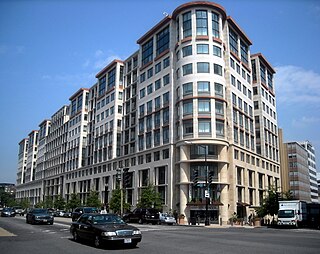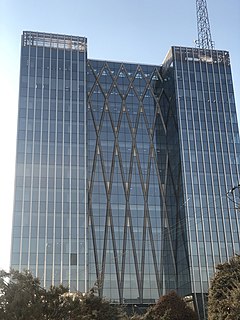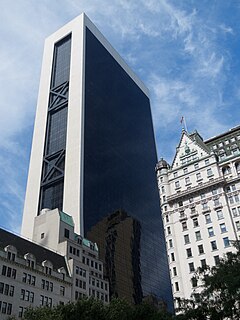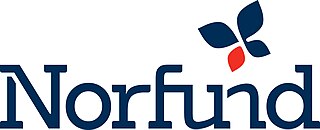
The International Finance Corporation (IFC) is an international financial institution that offers investment, advisory, and asset-management services to encourage private-sector development in less developed countries. The IFC is a member of the World Bank Group and is headquartered in Washington, D.C. in the United States.
Private equity (PE) typically refers to investment funds, generally organized as limited partnerships, that buy and restructure companies that are not publicly traded.

Venture capital (VC) is a form of private equity financing that is provided by venture capital firms or funds to startups, early-stage, and emerging companies that have been deemed to have high growth potential or which have demonstrated high growth. Venture capital firms or funds invest in these early-stage companies in exchange for equity, or an ownership stake. Venture capitalists take on the risk of financing risky start-ups in the hopes that some of the firms they support will become successful. Because startups face high uncertainty, VC investments have high rates of failure. The start-ups are usually based on an innovative technology or business model and they are usually from the high technology industries, such as information technology (IT), clean technology or biotechnology.
KKR & Co. Inc. is an American global investment company that manages multiple alternative asset classes, including private equity, energy, infrastructure, real estate, credit, and, through its strategic partners, hedge funds. The firm has completed more than 280 private equity investments in portfolio companies with approximately $545 billion of total enterprise value as of June 30, 2017. As of September 30, 2017, Assets Under Management ("AUM") and Fee Paying Assets Under Management ("FPAUM") were $153 billion and $114 billion, respectively.
The Government Pension Fund of Norway comprises two entirely separate sovereign wealth funds owned by the government of Norway.
A private-equity fund is a collective investment scheme used for making investments in various equity securities according to one of the investment strategies associated with private equity. Private equity funds are typically limited partnerships with a fixed term of 10 years. At inception, institutional investors make an unfunded commitment to the limited partnership, which is then drawn over the term of the fund. From the investors' point of view, funds can be traditional or asymmetric.

The Tehran Stock Exchange (TSE) is Iran's largest stock exchange, which first opened in 1967. The TSE is based in Tehran. As of May 2012, 339 companies with a combined market capitalization of US$104.21 billion were listed on TSE. TSE, which is a founding member of the Federation of Euro-Asian Stock Exchanges, has been one of the world's best performing stock exchanges in the years 2002 through 2013. TSE is an emerging or "frontier" market.
A venture capital trust or VCT is a tax efficient UK closed-end collective investment scheme designed to provide venture capital for small expanding companies, and income and/or capital gains for investors. VCTs are a form of publicly traded private equity, comparable to investment trusts in the UK or business development companies in the United States. VCTs tend to have a minority stake in the businesses they invest in, as opposed to private equity investing, where a majority stakeholder position is held.
In finance, the private equity secondary market refers to the buying and selling of pre-existing investor commitments to private equity and other alternative investment funds. Given the absence of established trading markets for these interests, the transfer of interests in private equity funds as well as hedge funds can be more complex and labor-intensive.
The Norwegian National Rail Administration was a government agency responsible for owning, maintaining, operating and developing the Norwegian railway network, including the track, stations, classification yards, traffic management and timetables. Safety oversight was the duty of the Norwegian Railway Inspectorate, while numerous operating companies run trains on the lines; the largest being the state owned passenger company Vy and the freight company CargoNet.
According to the Fourth Five-Year Economic Development Plan (2005–2010), the Privatization Organization of Iran affiliated with the Ministry of Economic Affairs and Finance is in charge of setting prices and ceding shares to the general public and on the Tehran Stock Exchange. The privatization effort is primarily backed by reformist members of the Iranian government and society who hope that privatization can bring about economic and social change.

Madison Dearborn Partners (MDP) is an American private equity firm specializing in leveraged buyouts of privately held or publicly traded companies, or divisions of larger companies; recapitalizations of family-owned or closely held companies; balance sheet restructurings; acquisition financings; and growth capital investments in mature companies. MDP operates using an industry-focused investment approach and focuses on the following sectors: basic industries, business & government software and services, financial & transaction services, health care, and TMT services. Since the founders established MDP as an independent firm in 1992, the firm has raised seven funds with aggregate capital of approximately $23 billion, and has completed investments in more than 130 companies.
Platinum Equity, LLC is an American private equity investment firm founded by Tom Gores in 1995. The firm focuses on leveraged buyout investments of established companies in the U.S., Europe and Asia.
The Royal Norwegian Ministry of Trade and Industry was a Norwegian ministry responsible for business, trade and industry. On 1 January 2014 it was merged into Ministry of Trade, Industry and Fisheries. From 2013 it was led by Monica Mæland, who continued as minister of trade, industry and fisheries from 2014 to 2018.

Apollo Global Management, Inc., is a global alternative investment manager firm. It was founded in 1990 by Leon Black, Josh Harris, and Marc Rowan. Apollo is headquartered in New York City, with offices across North America, Europe and Asia. The company's stock is publicly traded on the NYSE under the symbol 'APO'.

Norfund is a private equity company established by the Norwegian Storting (parliament) in 1997 and owned by the Norwegian Ministry of Foreign Affairs. The fund receives its investment capital from the state budget. Its head office is located in Oslo with local offices in Thailand, Costa Rica, Kenya, Mozambique and Ghana.

The history of private equity and venture capital and the development of these asset classes has occurred through a series of boom-and-bust cycles since the middle of the 20th century. Within the broader private equity industry, two distinct sub-industries, leveraged buyouts and venture capital experienced growth along parallel, although interrelated tracks.

UTEX Industries, Inc. is an American manufacturer of sealing products.

Private equity in the 2000s represents one of the major growth periods in the history of private equity and venture capital. Within the broader private equity industry, two distinct sub-industries, leveraged buyouts and venture capital expanded along parallel and interrelated tracks.
Impact investing refers to investments "made into companies, organizations, and funds with the intention to generate a measurable, beneficial social or environmental impact alongside a financial return". Impact investments provide capital to address social and/or environmental issues.







